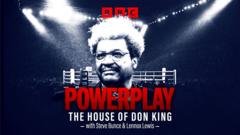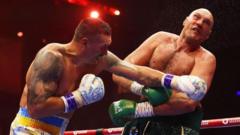Listen to Powerplay: The House of Don King on BBC Sounds
Ciaran Varley
BBC Sport Journalist
A new podcast series delves deep into the life and times of one of sport’s most charismatic and controversial figures – boxing promoter Don King.
King, 92, was the man behind some of the most famous fights in history, including the ‘Rumble in the Jungle’ between Muhammad Ali and George Foreman in 1974 and the 1975 ‘Thrilla in Manila’ between Ali and Joe Frazier.
He has promoted some of the biggest fighters in the sport, including Ali, Foreman, Frazier, Larry Holmes, Roberto Duran and Mike Tyson.
However, King is also a controversial figure. Before becoming a boxing promoter, the American made a living through illegal gambling and spent time in prison for killing a man.
A number of the boxers who King has worked with have gone on to sue him, including Tyson, who famously took out a $100m court case against his former promoter before accepting a $14m settlement in 2004.
In 1985, he was found not guilty of tax evasion and in 1998, after facing fraud charges carrying a potential forty-year sentence, King was once again acquitted.
Over the course of eight revealing episodes, Steve Bunce and three-time world heavyweight champion Lennox Lewis explore King’s remarkable life, with incredible stories from fellow promoters, fighters, journalists – and even an FBI agent who investigated him.
Here are a few takeaways…
Image source, Getty Images
Boxing journalist Colin Hart says he nearly fell off his chair laughing when he first encountered King at a press conference, speaking about a plan to stage a fight in Zaire (now the Democratic Republic of the Congo) at 4am
King’s criminal past
As a young man in Cleveland, King ran a numbers racket – an illegal form of gambling. In 1954, when a group attempted to rob one of his gambling houses, King shot dead one of the men, named Hillary Brown.
A court ruled that killing ‘justifiable homicide’ and he was released.
However, in 1966, King stomped Sam Garrett to death over a gambling debt and he was convicted of manslaughter. He spent just under four years in prison before being released on parole in 1971. In 1983, King was pardoned.
Using charm to get out of danger
Image source, Getty Images
Tyson once labelled his former promoter “ruthless”, “deplorable” and “greedy”
In episode two, Matchroom Sport founder Barry Hearn tells an incredible story about a time he witnessed the true strength of King’s persuasive powers.
Hearn claims he was sat in one of the promoter’s offices with King’s former aide, Al Braverman, when a man who was carrying a gun entered the room looking for King.
Hearn says that after about 20 minutes, King emerged from another office with his arm around the young man.
By this time, the assailant was wearing a “child-like grin”, while his promoter told him what a great heavyweight he was.
Hearn says: “This kid, who I believe sincerely was going in there to shoot Don King, was completely mesmerised by his charm offensive.”
‘They shot holes in the ceiling’ – when King’s boxers rebelled
Image source, Getty Images
Tim Witherspoon (right) was part of what’s become known as the ‘Lost Generation’ of heavyweights who failed to live up to their potential in the 1980s
In episode five, Tim Witherspoon tells a story about the time that he and other boxers at King’s gym staged a mutiny over missed payments.
The two-time world heavyweight champion claims a group of fighters broke windows in one of King’s houses and “messed up” his gym.
“They shot holes in the ceiling and when it rained water was leaking through,” says Witherspoon.
Witherspoon took King to court in 1992 and was awarded £1m in damages.
How ‘Ring Magazine scandal’ alerted FBI to King
Image source, Getty Images
The US Government failed to convict King of fraud charges in 1995
In 1976, King persuaded broadcaster ABC in America to back his new brainchild – the United States Boxing Championships. The plan was for 16 shows over a five-month period to find an American champion at eight weights.
The Ring Magazine was involved as an independent way of finding ranked fighters.
However, journalists uncovered that a number of boxers in the tournament had faked records and there were charges of kickbacks being exchanged for boxing rankings.
No-one was ever convicted, but the tournament was taken off air after four months.
“Don King, when questioned, simply said that he had no knowledge and he had nothing whatsoever to do with any of the allegations that were being made,” says Bunce.
Former FBI agent Joe Spinelli claims he followed King during the 1980s as part of an investigation into corruption in boxing. He also claims that when King was assaulted in 1981, he specifically requested that Spinelli investigate.
The former agent tells the story of his meeting with King in episode five.
According to Spinelli, King put his arm around the agent and told him he was “not the worst guy in boxing,” before adding: “I play by the rules. You know what the problem is, Joe? You don’t like the rules.”
King ‘pretended’ to play piano to woo Klitschko brothers
Image source, Getty Images
King apparently tried to sign the Klitschko brothers, using some inventive methods of persuasion
There are many stories within the series involving King employing different tactics to ingratiate himself with fighters that he wanted to work with.
In episode eight, former Boxing News editor Matt Christie relays one such story that he says was told to him by former heavyweight champion Vitali Klitschko in 2010.
Christie claims that on one visit to King’s house, the promoter – aware that both Vitali and brother Wladimir were fans of classical music – began playing a grand piano.
The brothers were “immediately very impressed,” says Christie. That is until they “took a few steps closer” and “realised that the sound was not coming from the piano and that King was merely pretending to play it”.
“It was at that point,” claims Christie, that the Klitschko brothers realised this was a man who they would not do business with.



